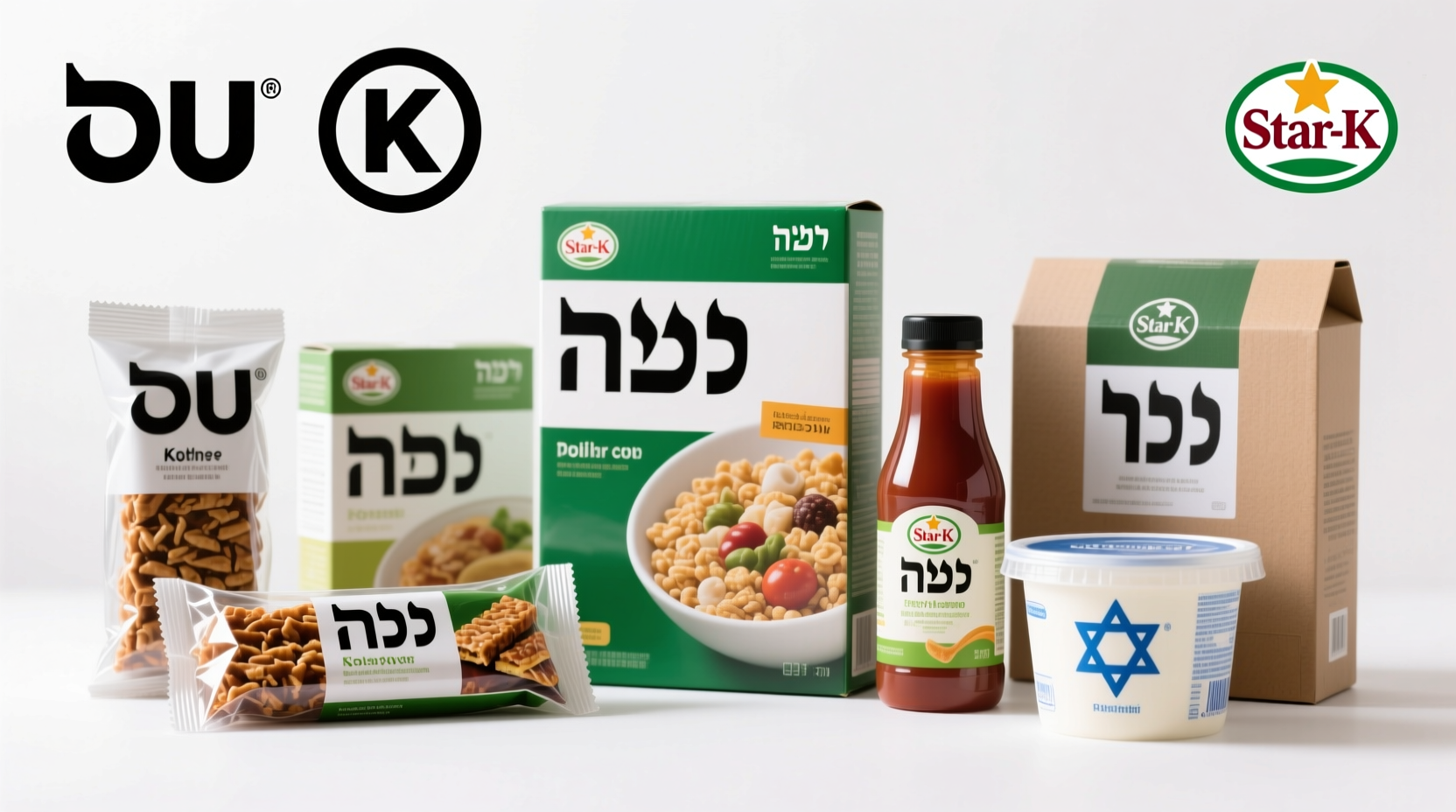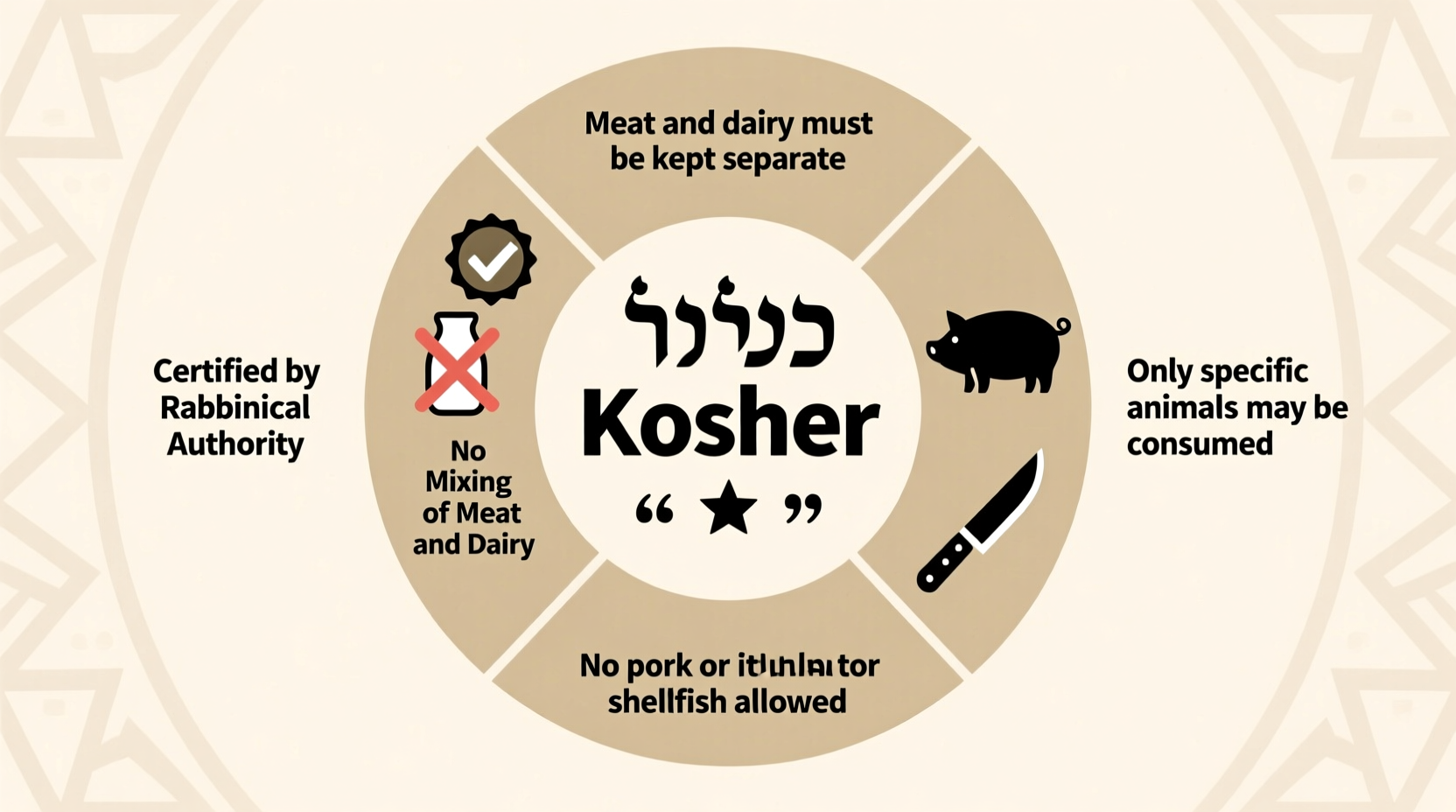Kosher food refers to products prepared according to Jewish dietary laws derived from the Torah, with specific rules governing which animals can be eaten, how they must be slaughtered, and how food must be prepared and served. This ancient system ensures foods meet religious requirements for observant Jewish communities worldwide.
Ever found yourself staring at a grocery shelf wondering what that circled-U symbol means? You're not alone. Understanding kosher food labels and practices matters to millions of consumers beyond the Jewish community—from health-conscious shoppers to those with specific dietary needs. This guide cuts through the confusion with clear, actionable information you can use immediately.
The Origins and Evolution of Kosher Dietary Laws
Kosher regulations trace back over 3,300 years to the Torah's books of Leviticus and Deuteronomy. What began as religious commandments have evolved into a sophisticated global certification system. The Talmud (completed around 500 CE) expanded these basic rules into detailed practical guidelines still followed today.
Key Milestones in Kosher Food History
- 1312 BCE: Original kosher laws given in the Torah
- 200-500 CE: Talmudic scholars codify practical applications
- 1800s: Industrial food production creates need for modern certification
- 1923: Orthodox Union (OU) launches first standardized kosher symbol
- Today: Over 1 million products globally carry kosher certification
What Actually Makes Food Kosher? The Core Principles
Kosher isn't just about blessings—it's a comprehensive system with specific requirements:
Permitted Animals and Proper Slaughter
Only animals with split hooves that chew their cud qualify as kosher meat. For seafood, only creatures with fins and scales meet requirements. The slaughter process (shechita) requires a specially trained individual (shochet) using an impeccably sharp knife to ensure minimal suffering.
| Kosher Category | Permitted Examples | Non-Kosher Examples |
|---|---|---|
| Land Animals | Cow, sheep, goat | Pig, rabbit, camel |
| Seafood | Salmon, tuna, cod | Shrimp, lobster, eel |
| Birds | Chicken, turkey, duck | Eagle, owl, vulture |
| Processing | No blood, proper supervision | Blood present, no supervision |
The Critical Separation of Dairy and Meat
Perhaps the most recognized kosher rule prohibits mixing dairy and meat products. This extends beyond cooking to include:
- Separate utensils, cookware, and dishware for dairy and meat
- Waiting periods (typically 3-6 hours) between consuming meat and dairy
- Complete separation in food production facilities
How to Identify Truly Kosher Products
Not all "kosher-style" foods are actually certified kosher. Look for these reliable indicators:
Recognizing Valid Kosher Certification Symbols
The most trustworthy products display certification from recognized agencies like:
- OU (Orthodox Union): Most widely recognized symbol globally
- Kof-K: Major international certification organization
- Star-K: Prominent certification with strict standards
- OK: Well-established international kosher supervision
Be cautious of unofficial symbols or vague terms like "kosher style" without proper certification. The presence of these symbols indicates rigorous inspection of ingredients, equipment, and production processes.

Practical Guidance for Everyday Kosher Shopping
Whether you're exploring kosher foods for religious reasons, dietary preferences, or curiosity, these tips help navigate the grocery aisles:
Reading Labels Like a Pro
Check ingredient lists for hidden non-kosher elements:
- Gelatin often comes from non-kosher animals
- "Natural flavors" may contain non-kosher derivatives
- Enzymes in cheese might be animal-based
- Fish sauce or anchovy paste in unexpected products
Understanding Common Misconceptions
Many people misunderstand kosher food principles:
- Myth: Kosher just means "blessed by a rabbi"
Fact: Blessings aren't required—proper preparation according to rules is essential - Myth: All Jewish people keep kosher
Fact: Observance varies widely across Jewish communities - Myth: Kosher and halal are identical
Fact: While similar in some aspects, they have distinct requirements and authorities
When Kosher Rules Apply and When They Don't
Kosher laws primarily affect:
- Foods consumed by observant Jewish individuals
- Products manufactured for kosher markets
- Meat, dairy, and pareve (neutral) food categories
They don't apply to:
- Non-food items (medicines, cosmetics)
- Foods prepared by non-Jews for non-Jewish consumption
- Emergency situations where health is at risk
Why Kosher Matters Beyond Religious Observance
Today, kosher certification serves diverse needs:
- Dietary restrictions: Helps vegetarians avoid hidden meat derivatives
- Allergy concerns: Clear separation of food categories benefits those with sensitivities
- Quality assurance: Strict production oversight often indicates higher manufacturing standards
- Global trade: Kosher certification opens markets in countries with religious dietary requirements
The kosher food industry has grown beyond its religious origins to influence mainstream food production worldwide. Major manufacturers often seek kosher certification to expand their market reach, making these symbols increasingly common on everyday products.
Frequently Asked Questions About Kosher Food
What does kosher actually mean in food context?
Kosher refers to food prepared according to Jewish dietary laws derived from the Torah. These laws specify which animals can be eaten, how they must be slaughtered, and how food must be processed and prepared to meet religious requirements.
How can I tell if a product is truly kosher?
Look for certification symbols from recognized agencies like OU (Orthodox Union), Kof-K, Star-K, or OK. These indicate the product has undergone rigorous inspection of ingredients, equipment, and production processes by qualified authorities.
Why do kosher rules separate dairy and meat?
The separation originates from the biblical prohibition against cooking a young goat in its mother's milk. This evolved into comprehensive rules requiring separate utensils, preparation areas, and waiting periods between consuming dairy and meat products.
Is all kosher food automatically healthy?
No, kosher certification relates to preparation methods and ingredient sources, not nutritional content. Kosher foods can be high in sugar, fat, or calories just like non-kosher options. The certification focuses on religious compliance rather than health properties.
What's the difference between kosher and halal?
While both are religious dietary systems, kosher follows Jewish law with specific animal restrictions and complete dairy-meat separation. Halal follows Islamic law with different slaughter methods and prohibits alcohol but allows certain foods forbidden in kosher practice. Each has distinct certification processes and authorities.











 浙公网安备
33010002000092号
浙公网安备
33010002000092号 浙B2-20120091-4
浙B2-20120091-4